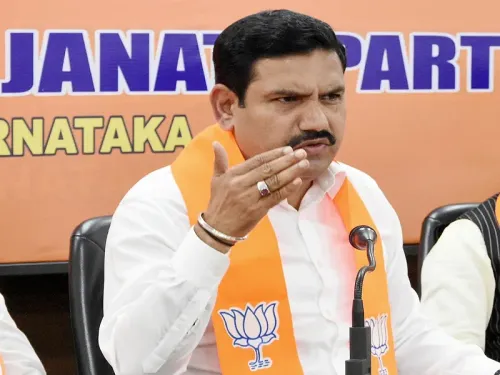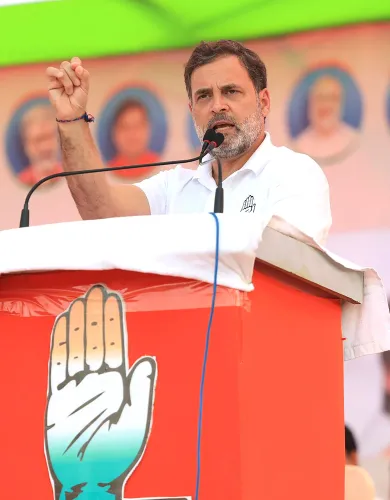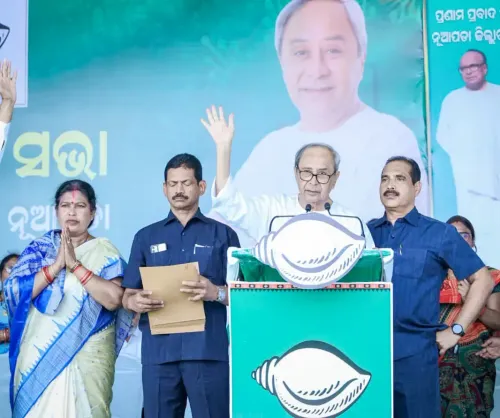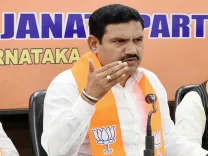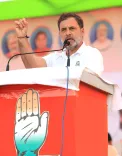How Does Vande Mataram Enhance the Nation's Self-Confidence?

Synopsis
Key Takeaways
- Vande Mataram celebrates 150 years of national pride.
- Prime Minister Modi emphasizes its role in boosting self-confidence.
- Commemorative stamps and coins were released.
- Nationwide mass singing events engage citizens.
- The song symbolizes unity and patriotism in India.
New Delhi, Nov 7 (NationPress) Prime Minister Narendra Modi officially launched the year-long celebration of 150 years of India’s National Song, 'Vande Mataram', at Indira Gandhi Indoor Stadium. During his address, he emphasized that Vande Mataram enhances the nation’s self-confidence and continues to motivate generations.
On this significant occasion, the Prime Minister unveiled a commemorative stamp and coin in honor of Vande Mataram. He also explored an exhibition themed around the national song.
Accompanying PM Modi were Delhi Chief Minister Rekha Gupta, Union Minister for Culture and Tourism Gajendra Singh Shekhawat, and Lieutenant Governor V.K. Saxena.
This event marked the official kick-off of a nationwide celebration lasting until November 7, 2026, in honor of this timeless piece by Bankim Chandra Chatterjee. The song, which played a pivotal role in India’s freedom movement, continues to evoke a sense of national pride and unity.
Addressing the audience, Prime Minister Modi stated, “Today, millions from across the nation join us in celebrating. I extend my heartfelt greetings with ‘Vande Mataram’. November 7 is a landmark day; we celebrate the 150th anniversary of Vande Mataram. This momentous occasion will reignite our spirits and energize millions of Indians. To commemorate this historical moment, we are releasing a special coin and postal stamp for Vande Mataram. This phrase is not just words; it is a mantra, a source of energy, a dream, and a commitment. Vande Mataram connects us to our heritage. It enhances our self-confidence and serves as a reminder that no aspiration is beyond our reach.”
He continued, “The experience of collectively singing Vande Mataram is indescribable. Today, as we celebrate the 150-year Maha Utsav, we aim to inspire and energize. To make this day unforgettable, we have issued a special coin and stamp.”
PM Modi also paid homage to those who made the ultimate sacrifice for their country. “I honor all who have given their lives for our motherland. I also send my congratulations to my fellow citizens. Each patriotic song carries its own emotion and message, yet the core essence of Vande Mataram embodies ‘Bharat’ and ‘Maa Bharati’,” he remarked.
Union Culture and Tourism Minister Gajendra Singh Shekhawat added, “Today, the entire nation partakes in the mass singing of Vande Mataram. We gather to honor the song that sparked our independence movement. Many who sacrificed their lives likely uttered their last words as Vande Mataram. As we celebrate 150 years of this iconic song, we must recognize that if there is one spirit that can unite all Indians in realizing the dream of a Viksit Bharat (Developed India), it is Vande Mataram. We are also launching a digital portal for citizens to share their renditions of Vande Mataram.”
The celebrations featured a mass singing of the full version of Vande Mataram at approximately 9:50 a.m. across public spaces nationwide, with enthusiastic participation from citizens, synchronized with the main event in Delhi.
The year 2025 marks the 150th anniversary of Vande Mataram. The national song was composed on the auspicious occasion of Akshaya Navami on November 7, 1875. It first appeared in the literary journal Bangadarshan as part of Bankim Chandra Chatterjee’s acclaimed novel Anandamath.
This song, invoking the Motherland as a symbol of strength, prosperity, and divinity, poetically expresses India’s awakening spirit of unity and self-respect. It quickly became a lasting emblem of devotion to the nation.
Historical documentation confirms that Vande Mataram was composed in 1875. Sri Aurobindo, in the English daily Bande Mataram on April 16, 1907, noted that Bankim composed this famous song 32 years earlier. He mentioned that few noticed it at first, but when Bengal arose from its long slumber, the people sought truth -- and in that moment of awakening, someone sang “Bande Mataram”.
Bankim Chandra Chatterjee (1838-1894), the creator of Vande Mataram, was a key figure in 19th-century Bengal. As a novelist, poet, and essayist, he significantly contributed to modern Bengali prose and articulated the developing spirit of Indian nationalism. His works demonstrate a profound intellectual and cultural engagement with the concept of India as a unified, spiritually vibrant nation.
Vande Mataram became the symbol of India’s fight for independence, encapsulating the collective yearning for self-governance and the emotional bond between the people and their homeland. Initially popularized during the Swadeshi and anti-partition movements, it transcended regional and linguistic divides to emerge as an anthem of national awakening.


